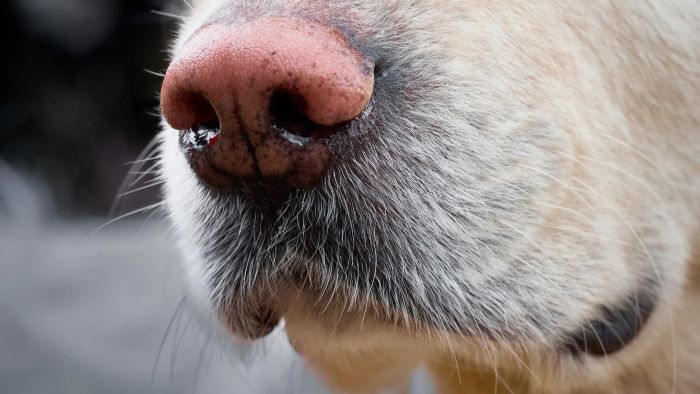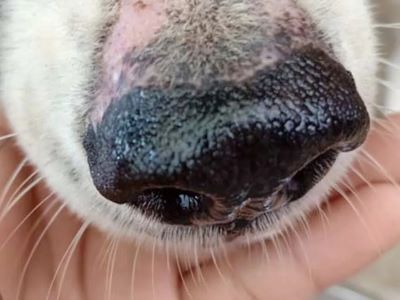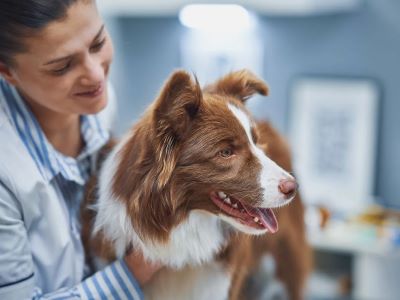The dog’s nose is one such organ which is always in active mode. Even if the dog sleeps still their nose doesn’t. There is no such odour that can escape the catch of a dog’s nose. Not only this but it is also dog’s nose is also an indicator of their health. If we humans have runny nose then it is a sign of cold, so if your dog is displaying the same sign you may wonder, “Why does my dog have a runny nose?”
Through our blog, we will try to provide you with all the required information. We will give you a brief idea of why your dog has a runny nose and how to cope with it.

The Importance of a Dog’s Nose
A dog’s nose is an important part of their body as it also acts as an indicator of their health. Here are reasons why a dog’s nose is important:
- A dog’s nose[1] can detect any odour easily, this is what makes them special. A dog’s nose has somewhat 300 million olfactory receptors, whereas humans have just 6 million of them.
- Dog’s nose helps them to understand the surroundings better through the smell. A dog’s nose can easily detect the sense of pheromones and helps them to know the matting opportunities.
- The nose of the dog helps them to know the whereabouts of other animals and sense the danger.
- It is also an indicator of their health. If the dog’s nose is dry then it is generally considered that the dog is healthy. If your dog is sick or dehydrated then the nose will turn out to be dry and flaky.
- The dog’s nose also works as their sweat gland and helps to maintain their body temperature. It also prevents their body from overheating.
Why Does My Dog Have a Runny Nose?

If your dog has a runny nose then there can be several reasons related to it. Here are some reasons why your dog might be having a runny nose:
Allergies
If your dog is having runny nose then allergy can be its reason. Dogs suffer from allergies due to the particles present in the environment. Some of the environmental particles that lead to allergy in dogs are pollen, dust particles and mold.
These particles present in the environment cause inflammation, and irritation and affect the dog’s nasal passage resulting in runny nose issues. Along with a runny nose dogs suffering from allergies may show symptoms like sneezing, coughing, irritation and itching.
Blockage
A runny nose in a dog can also be due to blockage. If certain objects, grass, seeds or any other dust particle get stuck in a dog’s nose then it can lead to blockage. The blockage in the dog’s nose affects the breathing in them leading to a runny nose in them.
If your dog has a runny nose due to blockage then you may also find bloody discharge, foul smell, and pus along with it.
Infection
Certain bacterial, fungal or viral infections in dogs too can cause runny noses in them. These infections can lead to sinus and upper respiratory tract infections in dogs. This infection causes a runny nose along with a thick yellow or green discharge.
This infection may also cause fever, loss of appetite and nose bleeding in dogs if not treated on time.
Polyps and tumours
Polyps or tumours are serious nasal conditions that can be fatal for dogs. For dogs suffering from this, you may even observe malignant growth along with nasal cavity. Due to this, the dog might experience a bloody discharge, difficulty in breathing along with facial swelling.
To identify the polyps and tumours in dogs X-rays and CT scans are required.
As mentioned in webmd, "Polyps and tumors. Blood, pus, or mucus can be a sign that your dog has nasal polyps (overgrown mucus-producing glands) or nasal tumors. Other signs include noisy breathing or a bulge on one side of the nose. Your pet’s appetite may decrease, as well."
How To Treat Your Dog’s Runny Nose at Home?
A dog’s runny nose may cause them irritation and affect their daily activities. Here are some ways to treat the dog’s runny nose at home:
- To treat your dog’s runny nose you can try to give him hot steam. For this, you can use a humidifier, a hot steamy bath or a vaporizer. The hot steam helps the mucus in a dog’s nose to loosen and clears the nasal passage.
- Keep your dog away from fragrances and smoke that can irritate their nose. Smoke, perfumes or any such strong smell can irritate your dog’s nose and can worsen the situation. If your dog is allergic to certain essential oils then keep it away from them.
- Keep your dog hydrated by providing them with constant water or any other fluid and provide them with nutritional food. That will help them to fight any infection with ease.
- Keep wiping your dog’s nose frequently so there is no mucous build-up and remove the discharge and the crust. Doing this will help to prevent further infection.
When To See a Vet for Your Dog’s Runny Nose?

If your dog has a runny nose then there can be various reasons associated with it. So here are some signs to observe to know when to see a vet for your dog’s runny nose:
- If along with a runny nose, your dog is having trouble breathing and if this continues for a long time then consult a vet.
- Even after treating it the runny nose keeps on coming back frequently.
- Bloody discharge along with thick greenish or brown discharge.
- Nose discolouration, and nose getting dry frequently.
FAQs
Why does my dog have a runny nose?
Your dog can have a runny nose for various reasons, it can be due to an allergy, infections or blockages. Certain bacterial or fungal infections may cause runny nose in dogs, this can happen due to the blockages. If something gets stuck in your dog’s nose then it too can lead to a runny nose in dogs. It is really important to keep the dog’s nose clean to avoid this issue.
What can you do for a dog with a runny nose?
If your dog has the issue of runny nose then there are various remedies you can try to provide them relief. You can provide them with hot steam this will help to lose the nasal congestion. Apart from this, you can also give your dog a spoonful of honey which will help to soothe the throat.
What does it mean when a dogs nose is wet?
Whether having a wet nose or a dry nose is always a sign of health problems. A lot of moisture or too little dryness in the nose, however, could be a sign of underlying problems such as allergies, infections, blockages, polyps, or tumours.
How long do runny noses last in dogs?
Dogs’ runny noses differ in duration based on what causes them and how they are treated. Upper respiratory infections often resolve in a week to ten days and are mild and self-limiting. However serious issues like allergies, blockages or tumours take longer time to go away.
Can dog allergies cause a runny nose?
Yes, a runny nose can be caused by dog allergies. Many things, including pollen, dust, mould, diet, medications, and fleas, can cause allergies in dogs. Sneezing, itching, nosebleeds, and clear nasal discharge may occur from allergies causing inflammation and irritation in the nasal passages.
Conclusion
If your dog is having a runny nose then it can be due to various factors. If you want then initially you can treat it at home with the remedies suggested by us through our blog, “Why does my dog have a runny nose?”.
Even after trying all the ways if the runny nose continues then you must consult a vet immediately. A runny nose is not often due to a cold it also has several serious reasons, which need to be addressed as soon as possible.
Reference:
- Maddyleigh. (2019, July 11). Know The Nose . . . Of Your Pet – Texas A&M Today. Texas a&M Today.



